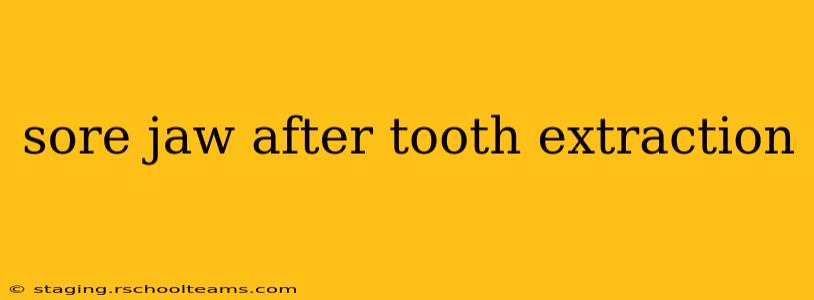Having a sore jaw after a tooth extraction is a common experience. While some discomfort is expected, persistent or severe pain can be concerning. This comprehensive guide explores the causes of jaw soreness post-extraction, effective treatment options, and preventive measures to minimize discomfort. We'll also address some frequently asked questions to help you manage your recovery effectively.
What Causes Jaw Soreness After Tooth Extraction?
Jaw pain following a tooth extraction stems from several factors. The primary cause is the surgical trauma itself. The extraction process involves manipulating the jawbone and surrounding tissues, leading to inflammation and pain. This inflammation is your body's natural response to injury, aiming to heal the affected area. Beyond the immediate trauma, other factors contributing to jaw soreness include:
- Inflammation: As mentioned, inflammation is a natural part of the healing process. However, excessive inflammation can cause significant pain and discomfort in the jaw.
- Muscle Strain: The procedure might involve opening your mouth wide for an extended period, leading to muscle strain in the jaw.
- Nerve Irritation: Sometimes, the extraction process can irritate nearby nerves, resulting in radiating pain extending beyond the extraction site to the jaw.
- Dry Socket (Alveolar Osteitis): This painful complication occurs when the blood clot protecting the extraction site dislodges or dissolves prematurely, exposing the underlying bone. While not directly causing jaw pain, it can contribute to overall discomfort and significantly intensify jaw soreness.
- Infection: Though less common with proper post-operative care, infection at the extraction site can lead to severe pain and swelling that can radiate into the jaw.
How Long Does Jaw Soreness After Tooth Extraction Last?
The duration of jaw soreness varies depending on the complexity of the extraction, individual healing rates, and adherence to post-operative instructions. Generally, you can expect some level of discomfort for the first few days, gradually decreasing in intensity over the following week. However, significant pain lasting longer than a week, or pain accompanied by fever or increased swelling, warrants immediate contact with your dentist or oral surgeon.
What Can I Do to Relieve Jaw Soreness After Tooth Extraction?
Managing jaw soreness involves a multi-pronged approach encompassing medication, home remedies, and lifestyle adjustments.
- Medication: Your dentist likely prescribed pain relievers (such as ibuprofen or acetaminophen) to manage post-operative pain. Follow the prescribed dosage and frequency carefully.
- Ice Packs: Applying ice packs to the affected area for 15-20 minutes at a time, several times a day, can help reduce swelling and numb the pain.
- Rest: Adequate rest allows your body to focus on healing. Avoid strenuous activities and excessive jaw movements.
- Soft Foods: Stick to a diet of soft, easily chewed foods during the initial recovery period. Avoid hard, crunchy, or chewy foods that could irritate the extraction site.
- Gentle Rinsing: After 24 hours, gently rinse your mouth with warm salt water several times a day to help keep the area clean and promote healing. Avoid vigorous rinsing or forceful spitting.
- Over-the-Counter Pain Relief: For milder pain, consider topical analgesics like benzocaine gel, applied as directed.
Is Jaw Pain After Tooth Extraction Normal?
Yes, some degree of jaw pain is considered normal after a tooth extraction. The intensity and duration of the pain can vary significantly depending on various factors. However, severe, persistent, or worsening pain is not normal and requires professional attention.
When Should I Call My Dentist About Jaw Pain After Tooth Extraction?
Contact your dentist immediately if you experience:
- Severe pain that isn't relieved by prescribed medication.
- Increased swelling or redness at the extraction site.
- High fever or chills.
- Bleeding that doesn't stop after several hours of gentle pressure.
- Pus or foul-smelling discharge from the extraction site.
- Numbness or tingling that persists beyond a few days.
How Can I Prevent Jaw Soreness After Tooth Extraction?
While you can't entirely eliminate the possibility of jaw soreness, following your dentist's post-operative instructions diligently can minimize discomfort. This includes carefully adhering to medication regimens, maintaining proper oral hygiene (gentle rinsing), following dietary restrictions, and avoiding strenuous activities.
This information is for general knowledge and does not constitute medical advice. Always consult your dentist or oral surgeon for personalized advice and treatment regarding jaw pain after tooth extraction. Their expertise will ensure your recovery is as comfortable and efficient as possible.
